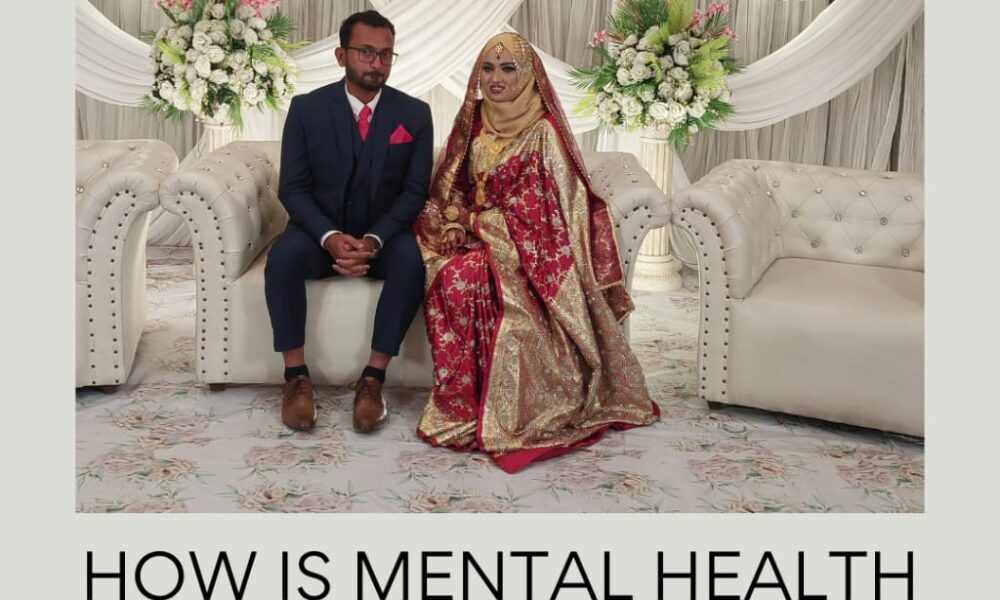How Is Mental Health After Marriage?2025
How Is Mental Health After Marriage?2025

How Is Mental Health After Marriage?2025.Marriage is often portrayed as a source of lifelong happiness, stability, and emotional support. While it certainly can bring joy, companionship, and personal growth, it can also introduce stress, conflict, and emotional strain. Mental health after marriage is a complex subject, influenced by personal expectations, communication patterns, lifestyle changes, cultural norms, and the overall quality of the relationship. Understanding how marriage affects mental health—both positively and negatively—is vital for nurturing emotional well-being and sustaining a healthy relationship.
-
How Is Mental Health After Marriage?The Psychological Landscape Before Marriage
Before diving into mental health after marriage, it’s important to understand the psychological state individuals often bring into the relationship. Everyone enters marriage with a unique mental and emotional framework shaped by past experiences, family background, trauma (if any), and personal coping mechanisms.
Some individuals view marriage as a stabilizing force, believing it will “fix” emotional issues such as loneliness or low self-esteem. Others may have unrealistic expectations shaped by media or cultural ideals, leading to disappointment when reality sets in. These pre-existing beliefs can significantly impact how mental health evolves after marriage.
-
How Is Mental Health After Marriage?Positive Impacts of Marriage on Mental Health
For many people, marriage provides a foundation of emotional support, companionship, and shared life goals. When the relationship is healthy, research shows that marriage can have significant mental health benefits.
-
How Is Mental Health After Marriage?Emotional Support and Stability
A loving spouse often serves as a primary source of emotional support. Being able to confide in someone, share worries, and navigate life’s challenges together can be deeply reassuring.
Studies have shown that individuals in satisfying marriages tend to experience:
- Lower levels of depression and anxiety
- Better stress management
- Increased happiness and life satisfaction
-
How Is Mental Health After Marriage?Improved Physical and Mental Well-being
Married individuals, particularly those in emotionally satisfying relationships, tend to engage in healthier behaviors. These include regular medical checkups, better dietary habits, and lower rates of substance abuse. There is a strong link between physical and mental health, meaning that a healthier body can contribute to a healthier mind.
-
How Is Mental Health After Marriage?Shared Responsibilities and Goals
Marriage can also ease the burden of life’s responsibilities. Sharing financial, household, and parenting duties reduces individual stress and creates a sense of partnership, especially when roles are balanced and mutually agreed upon.
- Intimacy and Companionship
Humans are inherently social beings, and meaningful connections are crucial for emotional well-being. Marriage offers the opportunity for physical intimacy, emotional bonding, and long-term companionship—all of which contribute to mental stability and fulfillment.
- Challenges and Negative Impacts on Mental Health After Marriage
While marriage has the potential to enhance well-being, it can also introduce new stressors. Not all marriages are happy or balanced, and even strong relationships go through difficult phases. These challenges can take a toll on mental health.
- Unrealistic Expectations
Many people enter marriage with idealized notions, influenced by movies, social media, or cultural scripts. When reality doesn’t match those expectations, disappointment can set in. This gap often leads to dissatisfaction, arguments, or even depression.
- Communication Issues
One of the leading causes of marital conflict is poor communication. Misunderstandings, lack of active listening, or unresolved grievances can create emotional distance. Over time, this may cause feelings of isolation, resentment, or anxiety.
- Financial Stress
Money is one of the most common sources of tension in a marriage. Differences in spending habits, debt, or unexpected financial burdens can lead to arguments and emotional strain. Financial instability is also linked to increased rates of depression and anxiety.
- Gender Roles and Unequal Labor
In many households, traditional gender roles persist. Women may carry the bulk of emotional and physical labor, including caregiving and household responsibilities, even when both partners work full-time. This imbalance can lead to burnout, low self-worth, and increased stress, particularly for women.
- Loss of Individual Identity
Some individuals struggle to maintain their personal identity after marriage. Prioritizing the relationship over personal interests, friendships, or career goals can lead to a sense of loss. Over time, this may contribute to frustration, low self-esteem, or a feeling of being trapped.
- Domestic Abuse and Toxic Relationships
In worst-case scenarios, marriage can become a source of trauma. Emotional, psychological, or physical abuse can have devastating effects on mental health. Victims of domestic violence often suffer from PTSD, anxiety, and long-term emotional damage.
- Mental Health Across Different Phases of Marriage
Mental health in marriage is not static; it evolves across different stages of the relationship.
- Honeymoon Phase
The early months or years of marriage often bring excitement and passion. This period, commonly called the “honeymoon phase,” is characterized by idealization and intense emotional connection. Mental health tends to be positive during this time, though it may mask underlying issues.
- Adjustment Phase
As the honeymoon phase fades, couples begin to face real-life challenges—career demands, financial decisions, family planning, etc. This phase often tests communication, patience, and emotional resilience. Mental stress may arise due to the shift in expectations and reality.
- Parenting Phase
The arrival of children introduces new responsibilities and emotional dynamics. While children can bring joy, parenting is often accompanied by sleep deprivation, financial pressure, and decreased couple time. Postpartum depression, particularly in mothers, is a significant mental health concern during this phase.
- Midlife and Career Pressures
In middle age, couples may experience stress related to career stagnation, caring for aging parents, or the empty nest syndrome. This phase often prompts existential reflection, and in some cases, marital dissatisfaction or midlife crises.
- Retirement and Aging
Later in life, couples may face issues like declining health, loss of loved ones, or shifting social roles. A strong emotional bond can provide support during this time, while unresolved conflicts or loneliness can lead to depression.
- Cultural and Social Influences
Cultural values heavily influence how marriage impacts mental health. In collectivist cultures, for instance, family expectations and societal pressure can override personal well-being. Arranged marriages, dowry demands, and stigma around divorce may lead individuals to stay in unhealthy relationships.
In contrast, more individualistic societies often prioritize personal fulfillment, and people may feel more empowered to leave toxic relationships, but might also struggle with higher rates of isolation or relationship instability.
- Strategies for Maintaining Good Mental Health in Marriage
The following strategies can help couples navigate the mental health landscape of marriage more effectively:
- Open and Honest Communication
Clear, respectful communication builds trust and reduces misunderstandings. Regular check-ins about feelings, goals, and challenges help couples stay emotionally connected.
- Setting Boundaries
It’s important for both partners to maintain personal space and individuality. Encouraging each other to pursue hobbies, friendships, and alone time can enhance well-being.
- Seeking Professional Help
There is no shame in seeking counseling. Couples therapy or individual therapy can provide valuable insights and coping tools. Professional help is especially crucial in cases of chronic stress, trauma, or emotional disconnect.
- Managing Expectations
Accepting that no marriage is perfect can help reduce unrealistic pressure. Healthy relationships involve effort, compromise, and the willingness to grow together.
- Balancing Responsibilities
Equitable sharing of domestic, financial, and parenting responsibilities reduces stress and resentment. Open discussions about workload can prevent emotional burnout, especially for women.
- Practicing Empathy and Appreciation
Small gestures of kindness and gratitude go a long way. Expressing appreciation and understanding your partner’s perspective fosters emotional closeness and reduces conflict.
- When Marriage Ends: Divorce and Its Mental Health Impacts
Sometimes, despite best efforts, a marriage may not work out. While divorce is often stigmatized, staying in a toxic or unfulfilling relationship can be even more damaging to mental health.
The end of a marriage can lead to:
- Grief and loss
- Financial instability
- Disruption of social networks
- Increased risk of depression or anxiety
However, many people also experience relief, personal growth, and renewed mental clarity after divorce, especially if the relationship was emotionally draining.
Marriage is often viewed as a significant milestone in life, symbolizing love, companionship, and the beginning of a shared journey. While it can bring immense joy and emotional support, it also introduces new dynamics and responsibilities that can impact mental health in both positive and negative ways. Understanding the psychological effects of marriage is crucial for maintaining well-being and fostering a healthy relationship.
The Positive Impacts of Marriage on Mental Health
- Emotional Support and Stability: One of the greatest benefits of marriage is having a consistent source of emotional support. A caring and understanding partner can act as a buffer against stress, helping to manage life’s challenges more effectively. Studies show that married individuals often report lower levels of anxiety and depression compared to their single counterparts.
- Sense of Belonging: Marriage can create a sense of belonging and purpose. Being part of a committed relationship helps individuals feel more connected and less lonely. This emotional bond contributes significantly to mental well-being.
- Healthier Lifestyle Choices: Married people are often more likely to adopt healthier lifestyles. Partners may encourage each other to eat well, exercise, and avoid harmful habits like excessive drinking or smoking, which can indirectly benefit mental health.
The Challenges to Mental Health After Marriage
While there are many benefits, marriage can also bring new stressors that may negatively affect mental health.
- Adjustment Issues: The early years of marriage require significant adjustment. Differences in habits, values, and expectations can lead to misunderstandings and conflict. If not addressed properly, these issues can cause emotional strain and anxiety.
- Increased Responsibilities: Marriage often comes with added responsibilities such as managing finances, household duties, and, later, parenting. The pressure to balance these roles can sometimes lead to feelings of being overwhelmed, especially if the responsibilities are not shared equally.
- Unrealistic Expectations: Many people enter marriage with idealized expectations. When reality does not align with these expectations, it can lead to disappointment, frustration, and emotional distress. Open communication and realistic goal-setting are essential to managing these expectations.
- Loss of Independence: Sharing life with another person may sometimes feel like a loss of personal space or freedom. Some individuals struggle with the reduced autonomy that comes with marital compromise, which can affect their mental well-being.
Gender Differences in Post-Marriage Mental Health
Mental health after marriage can differ by gender due to societal roles and expectations. For example, women are often expected to manage both professional responsibilities and household tasks, which can lead to increased stress and burnout. Men, on the other hand, may struggle with the pressure to be the primary provider or maintain emotional restraint, which can suppress mental health issues.
Importance of Communication and Counseling
Effective communication is the cornerstone of a healthy marriage. Partners should feel comfortable discussing their feelings, needs, and concerns. When communication breaks down, resentment and emotional distance can develop, increasing the risk of mental health problems.
Marriage counseling or couples therapy can be highly beneficial. It provides a neutral space to address conflicts, improve understanding, and build stronger emotional connections. Seeking help is not a sign of failure but a proactive step toward a healthier relationship and improved mental well-being.
Conclusion
Marriage has a profound impact on mental health—but its effects are not uniform or one-dimensional. In a healthy relationship, marriage can be a source of emotional strength, companionship, and psychological well-being. In an unhealthy or stressful marriage, it can contribute to anxiety, depression, or emotional burnout.
Understanding the dynamic nature of marital relationships, setting realistic expectations, and nurturing open communication are key to promoting mental health after marriage. Whether newly married or years into the journey, prioritizing emotional well-being—individually and as a couple—can lead to a more fulfilling and resilient partnership. Mental health after marriage is a complex interplay of emotional support, personal expectations, and shared responsibilities. While marriage can offer stability and companionship, it also requires ongoing effort, mutual respect, and open communication to navigate its challenges. By acknowledging both the positives and the potential stressors, couples can work together to create a relationship that nurtures their mental health and overall happiness.







